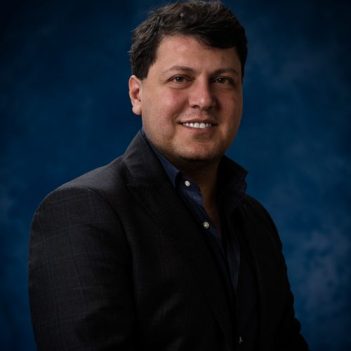Giovanni Pioggia, Electronic Engineer with specialization in Bioengineering, PhD in Robotics, is a
senior researcher of the National Research Council (CNR), Institute for Biomedical Research and
Innovation (IRIB), section manager of Messina secondary unit.
His research activities are focused on health challenges. The aim is the development of innovative
diagnostic approaches and innovative therapeutic solutions, directly or indirectly related to clinical
activity, using bioengineering methods and technologies, as sensors, modelling, machine learning,
artificial intelligence, humanoid robots, wearable devices, virtual reality and serious games. Health
challenges are mainly related to autism spectrum disorders, children disabilities and co-
morbidities, cardiopulmonary disabilities, psychological stress related disorders. He adopts a
bottom-up approach exploring basic research, biomarker discovery, implementation and
assessment of clinical prototypes towards technological transfer.
The domains of his research are biomedical sensing, early diagnosis and treatment, digital
therapeutics, social robotics and computational science. Biomedical sensors and wearable devices
are used to non-invasively investigate the link among behavioural, neuro-psychological and neuro-
functional discoveries. The overall objective of early diagnosis and treatment is to identify the
most effective protocols for prevention and screening, generalisation of skills and maximisation of
child’s adaptive functioning. The exploration of digital therapeutics and social robots is dedicated
to social-emotional processing, rehabilitation and evidence-based software intervention, often
using augmented psychology, in order to help people with communication difficulties to learn,
identify and use emotional information, and to adapt to social context. He has sought to extend
knowledge of higher mental functions by building biomorphic electronics.
His experimental research studies aim to improve knowledge on the physiological and behavioural
substrate of neurodevelopmental disorders and neurosensory, neuromotor, socio-emotional and
cognitive deficits. In particular, he is exploring the use of robotic technologies for the assessment
of social-emotional processing and rehabilitation. Activities based on human-computer
interaction, imitation and the pragmatic use of social and emotional reciprocity, as well as the
study of the system of recognition and regulation of emotions, intersubjectivity and the social
mind, aim to provide robotic solutions to improve assessment, and rehabilitation techniques. He
has also focused on neuromotor and neurosensory analysis, bioengineering of affective and
emotional development and social interactions.
Research Area: Bioengineering



